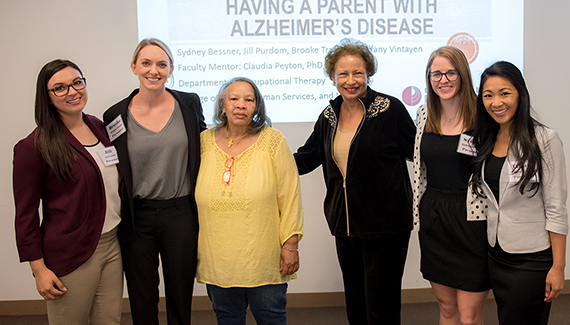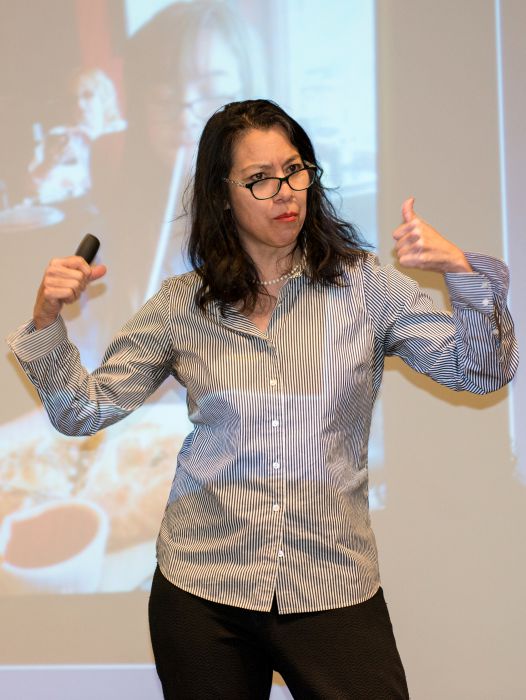
Showcasing the popularity of Student Research Day (SRD) at California State University, Dominguez Hills (CSUDH), this year more than 450 students found time during their busy academic schedules to develop and present comprehensive research to the campus community.
The over-whelming response in student submissions resulted in the largest SRD in the event’s 11-year history on the campus, and the decision to extend the conference over two days.
Along with the hundreds of student presenters, nearly 100 faculty served as mentors, and more than 170 faculty, staff, alumni and outside professionals sat in on sessions to critique their work.
“It’s unbelievable! The number of students involved continues to rise each year,” said Ellen Junn, provost and vice president for Academic Affairs at CSUDH, who addressed a packed Loker Student Union ballroom during the lunch program on day one of SRD. “You [the students] are among a very unique group. You get to have an experience that not all students in undergraduate institutions have–to get involved directly with your faculty in your research, scholarly work or creative activities… I’ve been at a number of institutions and I can say this is the most faculty engagement with students that I’ve seen.”
Comedian Sandra Tsing Loh served as keynote speaker during the lunch program. She has been named one of “America’s 50 Most Influential Comedians” by Variety magazine, has performed off-Broadway solo comedy shows, has done radio commentary on NPR’s “Morning Edition” and ”This American Life,” and has her own radio shows on KPCC called “The Loh Life” and the syndicated “The Loh Down on Science.” A prolific writer, her new book “Madwoman in the Volvo: My Year of Raging Hormones,” was named among the “100 Most Notable Books of 2014” by the New York Times.
Loh weaved together heartfelt academic messages and comedy during her remarks, which left the audience in stitches.
“I’m hoping some of you find as you present your research that there might be a passion for teaching there,” said Loh, who teaches science communication at the University of California, Irvine. “I’m a middle-aged lady, so I might get a little weepy about this, but I think the teachers are the real heroes of today… It’s such an important mission for universities to give this kind of research opportunity, this kind of communication, and this kind of energy and community to the next generation.”
Each CSUDH college was represented during SRD–from the sciences and the arts, to education and business.

Sean Rodriguez, who is majoring in Negotiation, Conflict Resolution and Peacebuilding, delved into the controversial topic of raising the minimum wage during his presentation “Is California Ready for a $15 per hour Minimum Wage?” He conducted five in-depth interviews to conduct his research: two business owners, the district director of an California assembly member, a minimum wage employee, and an unemployed teenager.
I’m hoping some of you find as you present your research that there might be a passion for teaching there. -Sandra Tsing Loh
During his research, Rodriquez found that augments for the minimum wage increase included a potential decrease in the cost and need for government assistance programs, and that higher wages will allow people to spend more, which would create more jobs. Arguments against the increase focused in part on a drop in the employment rate, less job prospects for younger and inexperienced workers due to employers’ unwillingness to offer entry-level positions, and that a mandatory $15 pay rate could hurt small businesses and “mom-and-pop shops.”
Rodriquez also inquired about the idea of an “age wage,” paying people under 18 a little less than adults.
“One of the business owners believes that they should pay people based on merit, not age, so he rejected the idea of an age wage,” said Rodriquez. “The district director said you need to differentiate between teenagers in need of a summer job and adults who actually need to live off this wage.”
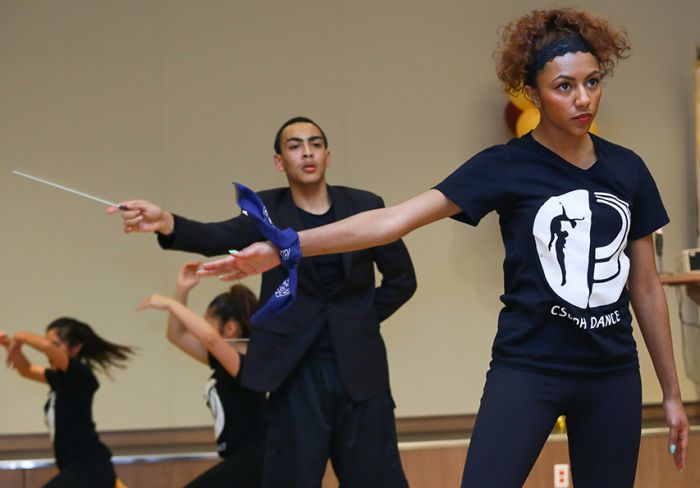
During the awards ceremony at the end of day two, both solo and teams of student presenters garnered either first place or runner-up awards in their sessions.
Anthropology student Leah Sanchez grabbed two awards in two College of Behavioral and Social Sciences sessions. She took 1st Place for her solo presentation “Identifying Social Hierarchy in a Virtual Game World,” and was named runner-up with team members Brenda Ramirez and Luis Villanueva for their presentation “Culture through Body: An Ethnographic Exploration of a Classical Cambodian Dance Studio.” Their faculty mentor for both presentations was Susan Needham, professor and chair of the Anthropology Department at CSUDH.
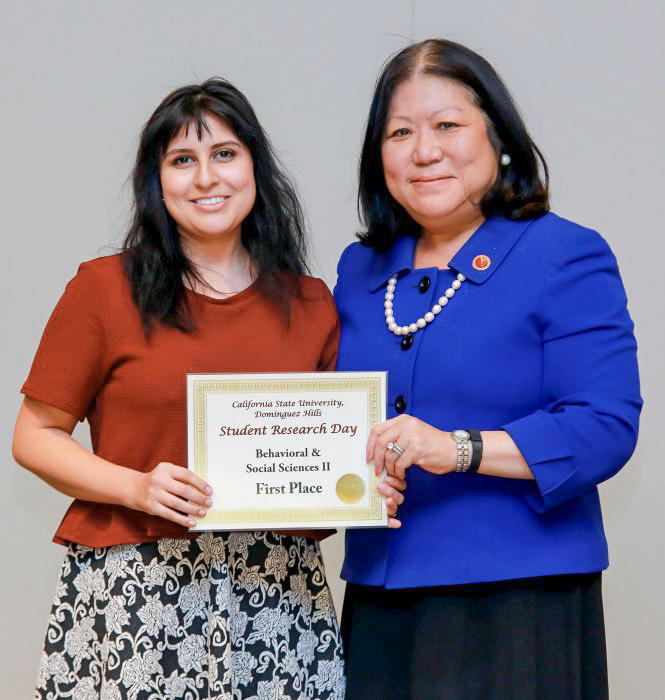
“It’s really important that anthropology students are well versed in ethnographic qualitative research methods. So this project was done to really get familiar with those methods and to conduct professional and quality research data,” said Sanchez, whose team worked with a dance studio to gather research. “For our project, we looked at the shape of the studio and the layout, and at social hierarchies. We became concerned with how knowledge was being transmitted in this environment, who transmits it, and how. We discovered this is done primarily through three means: storytelling, which is a natural part of the dance; modeling in which the instructor will show the position physically; and embodying molding in which instructor will physically mold and shape the bodies of the students.”
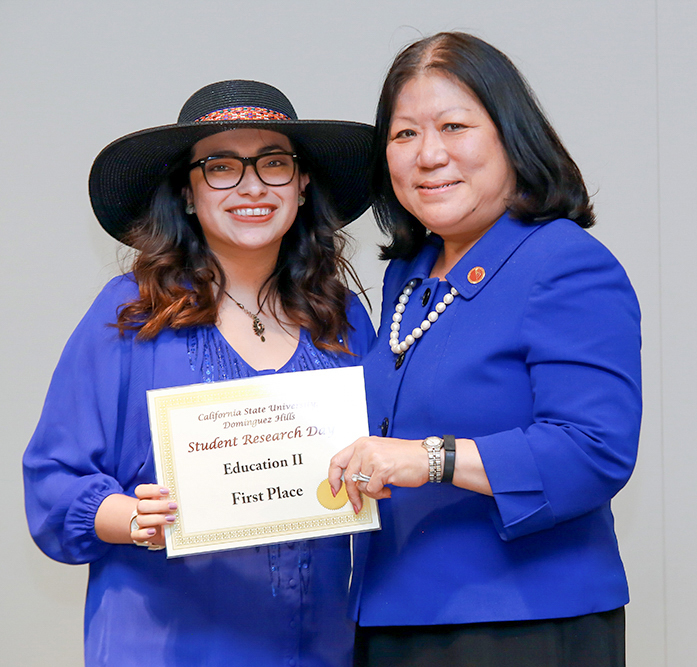
Chicana/o Studies major Gabriela Corona’s presentation “Middle School Experiences of Lesbian, Gay, Bisexual, Transgender, and Queer Students” took the 1st Place award in the Education II session. Her faculty mentor was Corina Benavides Lopez, assistant professor of Chicana/o Studies.
Corona chose her topic due her curiosity about “true crime.”
“After looking at murders in California, I realized that there was a lot of homophobic murders involving young adults and even children, so I wanted to look into what was causing this kind of activity,” said Corona. “I found that people may discover their sexual identity as early as elementary school. Some people I interviewed came to terms with their sexual identity as early as 10 years old.”
Several of the winning students will represent CSUDH at the 30th Annual CSU Student Research Competition on April 29-30 at California State University, Bakersfield.
